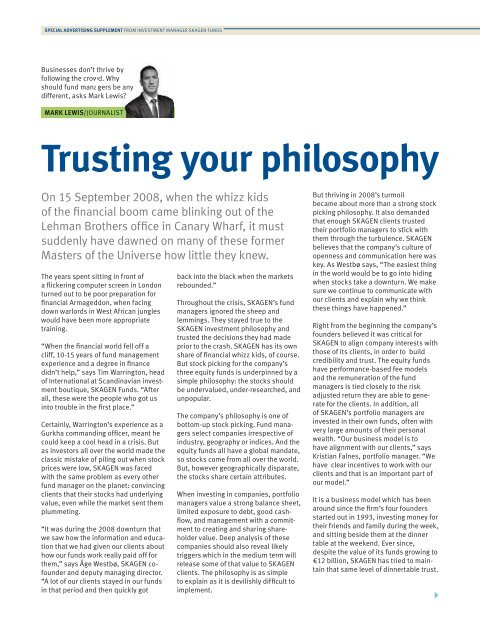Old school New England 92 - Scanorama
Old school New England 92 - Scanorama
Old school New England 92 - Scanorama
Create successful ePaper yourself
Turn your PDF publications into a flip-book with our unique Google optimized e-Paper software.
SPECIAL ADVERTISING SUPPLEMENT FROM INVESTMENT MANAGER SKAGEN FUNDS<br />
Businesses don’t thrive by<br />
following the crowd. Why<br />
should fund managers be any<br />
different, asks Mark Lewis?<br />
MARK LEWIS/JOURNALIST<br />
Trusting your philosophy<br />
On 15 September 2008, when the whizz kids<br />
of the fi nancial boom came blinking out of the<br />
Lehman Brothers offi ce in Canary Wharf, it must<br />
suddenly have dawned on many of these former<br />
Masters of the Universe how little they knew.<br />
The years spent sitting in front of<br />
a fl ickering computer screen in London<br />
turned out to be poor preparation for<br />
fi nancial Armageddon, when facing<br />
down warlords in West African jungles<br />
would have been more appropriate<br />
training.<br />
“When the fi nancial world fell off a<br />
cliff, 10-15 years of fund management<br />
experience and a degree in fi nance<br />
didn’t help,” says Tim Warrington, head<br />
of International at Scandinavian investment<br />
boutique, SKAGEN Funds. “After<br />
all, these were the people who got us<br />
into trouble in the fi rst place.”<br />
Certainly, Warrington’s experience as a<br />
Gurkha commanding offi cer, meant he<br />
could keep a cool head in a crisis. But<br />
as investors all over the world made the<br />
classic mistake of piling out when stock<br />
prices were low, SKAGEN was faced<br />
with the same problem as every other<br />
fund manager on the planet: convincing<br />
clients that their stocks had underlying<br />
value, even while the market sent them<br />
plummeting.<br />
“It was during the 2008 downturn that<br />
we saw how the information and education<br />
that we had given our clients about<br />
how our funds work really paid off for<br />
them,” says Åge Westbø, SKAGEN cofounder<br />
and deputy managing director.<br />
“A lot of our clients stayed in our funds<br />
in that period and then quickly got<br />
back into the black when the markets<br />
rebounded.”<br />
Throughout the crisis, SKAGEN’s fund<br />
managers ignored the sheep and<br />
lemmings. They stayed true to the<br />
SKAGEN investment philosophy and<br />
trusted the decisions they had made<br />
prior to the crash. SKAGEN has its own<br />
share of fi nancial whizz kids, of course.<br />
But stock picking for the company’s<br />
three equity funds is underpinned by a<br />
simple philosophy: the stocks should<br />
be undervalued, under-researched, and<br />
unpopular.<br />
The company’s philosophy is one of<br />
bottom-up stock picking. Fund managers<br />
select companies irrespective of<br />
industry, geography or indices. And the<br />
equity funds all have a global mandate,<br />
so stocks come from all over the world.<br />
But, however geographically disparate,<br />
the stocks share certain attributes.<br />
When investing in companies, portfolio<br />
managers value a strong balance sheet,<br />
limited exposure to debt, good cashfl<br />
ow, and management with a commitment<br />
to creating and sharing shareholder<br />
value. Deep analysis of these<br />
companies should also reveal likely<br />
triggers which in the medium term will<br />
release some of that value to SKAGEN<br />
clients. The philosophy is as simple<br />
to explain as it is devilishly diffi cult to<br />
implement.<br />
But thriving in 2008’s turmoil<br />
became about more than a strong stock<br />
picking philosophy. It also demanded<br />
that enough SKAGEN clients trusted<br />
their portfolio managers to stick with<br />
them through the turbulence. SKAGEN<br />
believes that the company’s culture of<br />
openness and communication here was<br />
key. As Westbø says, “The easiest thing<br />
in the world would be to go into hiding<br />
when stocks take a downturn. We make<br />
sure we continue to communicate with<br />
our clients and explain why we think<br />
these things have happened.”<br />
Right from the beginning the company’s<br />
founders believed it was critical for<br />
SKAGEN to align company interests with<br />
those of its clients, in order to build<br />
credibility and trust. The equity funds<br />
have performance-based fee models<br />
and the remuneration of the fund<br />
managers is tied closely to the risk<br />
adjusted return they are able to generate<br />
for the clients. In addition, all<br />
of SKAGEN’s portfolio managers are<br />
invested in their own funds, often with<br />
very large amounts of their personal<br />
wealth. “Our business model is to<br />
have alignment with our clients,” says<br />
Kristian Falnes, portfolio manager. “We<br />
have clear incentives to work with our<br />
clients and that is an important part of<br />
our model.”<br />
It is a business model which has been<br />
around since the fi rm’s four founders<br />
started out in 1993, investing money for<br />
their friends and family during the week,<br />
and sitting beside them at the dinner<br />
table at the weekend. Ever since,<br />
despite the value of its funds growing to<br />
€12 billion, SKAGEN has tried to maintain<br />
that same level of dinnertable trust.<br />
�












